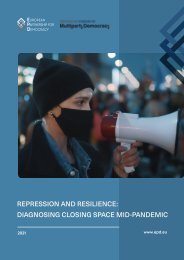Thinking Democratically: A Comprehensive Approach to Countering and Preventing Shrinking Space
You also want an ePaper? Increase the reach of your titles
YUMPU automatically turns print PDFs into web optimized ePapers that Google loves.
Civil society was much stronger in its defense of democratic space, however, when the judiciary was<br />
still capable of upholding constitutionalism. In the absence of an independent judiciary or a<br />
constitution that provides for a functional separation of powers, participa<strong>to</strong>ry mechanisms <strong>and</strong> strong<br />
guarantees <strong>to</strong> rights <strong>and</strong> freedoms, civil society groups have resorted <strong>to</strong> demonstrations rather than<br />
the courts. This highlights the importance of calling out <strong>and</strong> countering government actions that<br />
undermine the independence of the judiciary.<br />
Civil society has had its allies in the defense of democratic space. Opposition parties have, in most<br />
cases, s<strong>to</strong>od up for democratic space by countering legislative proposals <strong>and</strong> allying with civil society.<br />
Especially smaller political parties have played an important role in cases where larger opposition<br />
parties contributed <strong>to</strong> the closing of space. The case studies emphasised that the elec<strong>to</strong>ral system is<br />
a major determinant of whether <strong>and</strong> when political parties will protect democratic space. This is in<br />
line with the findings of Dodsworth <strong>and</strong> Cheeseman (2017), who sought <strong>to</strong> underst<strong>and</strong> when<br />
Parliamentarians defend civic space against restrictive legislation with case studies from Kyrgyzstan<br />
<strong>and</strong> Kenya. 76<br />
While the case studies did not focus on the role of media in defending democratic space, their<br />
function as a watchdog <strong>and</strong> amplifier of critical voices cannot be understated. As space for civil<br />
society has been restricted through the various strategies described above, many au<strong>to</strong>cratising<br />
regimes are increasingly focusing their efforts on restricting media freedom. 77 As mentioned above,<br />
the Russian Foreign Agents law was initially adopted <strong>to</strong> restrict civil society, but recently adapted <strong>to</strong><br />
also limit media freedom. The role of media in defending democratic space should be looked at<br />
further so as <strong>to</strong> identify entry points for supporting media in such situations.<br />
These findings are in line with studies by ECDPM <strong>and</strong> Brechenmacher <strong>and</strong> Carothers. While they have<br />
also identified the multitude of ac<strong>to</strong>rs involved in the closing <strong>and</strong> defense of democratic space, this<br />
study sheds a new light on the dual role of political parties. Some case studies even hinted that a<br />
different political party in power did not change much <strong>to</strong> the ongoing shrinking of space. For longterm<br />
change, working with political parties <strong>and</strong> changing incentive structures through elec<strong>to</strong>ral<br />
reform will be essential for defending democratic space. This study also further emphasises the role<br />
of businesses <strong>and</strong> criminal networks in closing space, pointing <strong>to</strong> the need for a multilevel whole-ofsociety<br />
approach in responding <strong>to</strong> the complex challenge.<br />
76<br />
Dodsworth, S. & Cheeseman, N. 2017: Defending democracy: when do parliaments protect political space? Available here.<br />
77<br />
Repucci, S. 2019: Freedom <strong>and</strong> the Media: a downward spiral. Freedom House. Available here.<br />
47

















